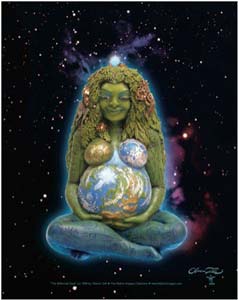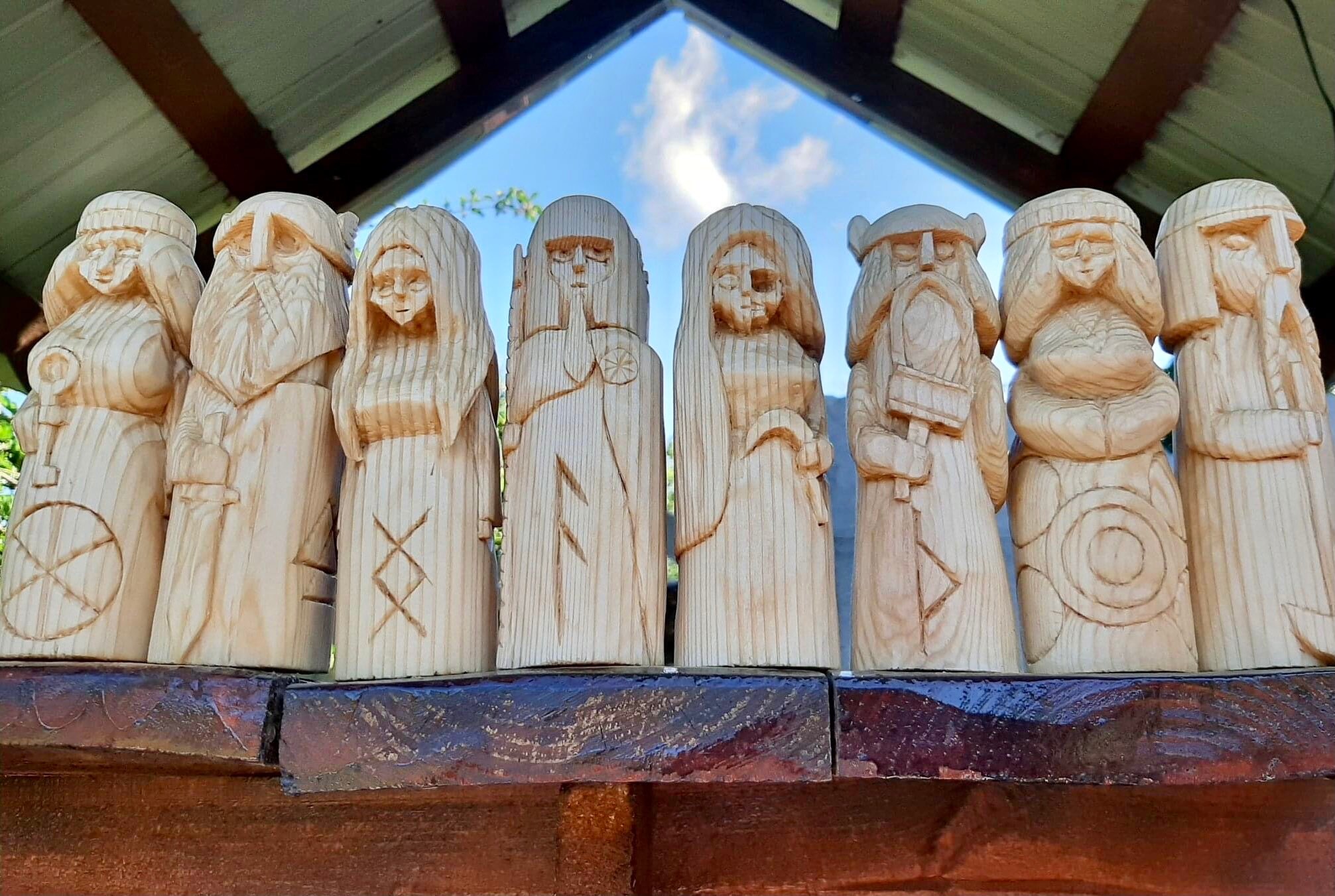Wait, what? But can’t I, as a Pagan, choose just one god to worship? Of course! (more on that below). However, even in that minority of cases, it’s still not complete control due to the control that you, as a Pagan, still have (see Part 1, Paganism Empowers You).
In Paganism, no single deity is in complete control. Usually, there are many different deities with different areas of control (such as Poseidon for the sea, Tyr for heroism), etc. Even in the less common monotheistic forms of Paganism, that one deity is not often in complete control of everything, especially not the Pagan themselves.

As in all parts of this series, the main differences between Paganism and many other religions are interrelated, so there’ll be a lot of overlap. Many of them link back to the basic difference that Paganism explicitly empowers you, instead of denigrating you (see Part 1, Paganism Empowers You).
In polytheistic Paganism, there are many goddesses and gods, in many pantheons. Some Pagans believe only their pantheon exists, more, I think, believe that other pantheons exist, but don’t speak to them. This is similar to henotheism – which, unlike monotheism (the belief that only one goddess or god exists), is the belief that other goddesses or gods exist, but only one is worshipped. Even in a given pantheon (henotheistic or not), it’s most common for different deities to rule different aspects, and so each deity is only in limited control (such as, say, in control of lakes). Going to actual, monotheistic forms of Paganism (such as “Goddess only” Wiccans), that one deity is rarely in active control, but rather subject to the laws of nature, or embodying the indifferent laws of nature. This distinction seems trivial, but it’s very important. It means that Gaia, or Mother Earth, can’t arbitrarily decide to suspend the physical laws of the Universe and enact some punishment to keep someone in line – and as a result is another “person” like us – not an all powerful ruler.

And of course, in varieties of Paganism *without any* deities – such as pantheistic or naturalistic types of Paganism, there certainly is no single goddess or god in control of anything because there aren’t even any conscious goddesses or gods at all.
If one deity is in control of everything, then it’s easy for the church of that deity, or their highest priest, to claim the divine right to of control of everything in real life, and the control of everyone. After all, no one can claim to be the follower of some other deity (and hence free from control), if one deity is in control of everything and is the only deity which exists. Such control cannot be questioned, because there is only one deity in control of everything. This is why monotheistic religions are so easily the willing and powerful tools of authoritarian regimes, including too many examples to count, from the Holy Roman Emperor, to the divine right of kings, Constantine, to the Ottoman empire, and even Putin today with support from the Christian Orthodox Patriarch Kirill.
Conversely, without one deity (and hence human leader) in charge, Pagans are always free to simply leave any divine relationship which becomes toxic. Whether or not the deity is “real” in the real world is irrelevant (in both cases of Pagan and non-Pagan religion). Not happy with how things are going with Freya? Maybe Frigg is calling? Or Aphrodite. Or Naturalistic Paganism. Or Kali. As a Pagan, you have the freedom (and immense power) to simply leave. The dynamic is similar to that in an abusive, narcissistic relationship. If you aren’t free to leave, you aren’t safe – and instead are vulnerable to any abuse, control, and exploitation.
This is why the founding of the United States, using the Enlightenment value of the separation of church and state, was such a monumental change. Church and state had always been practically the same thing, for many thousands of years, in many different cultures. The state had the power to enforce religious conformity, which in turn legitimized the use of force by the authoritarian regime, which so often had the “legitimacy” given by the monotheistic religion to crush any opposition to it’s total control.
Paganism turns that on it’s head by rejecting the idea of one deity in control of everything. Without one deity in control of everything, it’s a lot harder to have one authoritarian leader speaking for that one deity. Some people can be following other gods (or none), and hence not subject to religiously approved control by the authoritarian leader. Very importantly as well – you can get information from multiple sources. No authoritarian leader is the only source of information. This fits with Paganisms support of learning and knowledge – as pointed out in Part 1. Paganism’s rejection of one deity in control aligns with Paganism’s strong thread of individual freedom. That’s not to say that authoritarian leaders can’t arise in Paganism – they certainly can, as they can in any religious group – it’s just less likely.

This is probably a lot of the reason why Christian America has such a huge problem with Paganism. After all, we know it’s not the doctrinal or theological differences – all that that was so easily tossed out the window with Mitt Romney’s candidacy. He still had the overwhelming support of the Evangelical right – even though his LDS faith rejects such basic doctrines as the canon of the Bibles, the nature of the Trinity, even the nature of Jesus, and what Heaven is – among many others.
This could be why Paganism is so much more prevalent outside of American conservatism, and why Trump, as an authoritarian leader, received over 80% of the Evangelical vote – more than any presidential candidate in US history.
Of course, I don’t get credit for recognizing this. Others have pointed it out again and again. Here’s a good example: “Witchcraft is inherently anti-authoritarian”
As before – it’s one of the many reasons I’m so proud to be a Pagan myself.
Blessed be!
The Author: Jon Cleland Host
Starstuff, Contemplating: We are assemblages of ancient atoms forged in stars – atoms organized by history to the point of consciousness, now able to contemplate this sacred Universe of which we are a tiny, but wondrous, part.

Dr. Jon Cleland Host is a scientist who earned his PhD in materials science at Northwestern University & has conducted research at Hemlock Semiconductor and Dow Corning since 1997. He holds eight patents and has authored over three dozen internal scientific papers and eleven papers for peer-reviewed scientific journals, including the journal Nature. He has taught classes on biology, math, chemistry, physics and general science at Delta College and Saginaw Valley State University. Jon grew up near Pontiac, and has been building a reality-based spirituality for over 30 years, first as a Catholic and now as a Unitarian Universalist, including collaborating with Michael Dowd and Connie Barlow to spread the awe and wonder of the Great Story of our Universe (see www.thegreatstory.org, and the blog at evolutionarytimes.org). Jon and his wife have four sons, whom they embrace within a Universe-centered, Pagan, family spirituality. He currently moderates the yahoo group Naturalistic Paganism.
 Naturalistic Paganism
Naturalistic Paganism


Pingback: New Series! Paganism is Different! Part 0 [Stardust, Contemplating] | Naturalistic Paganism